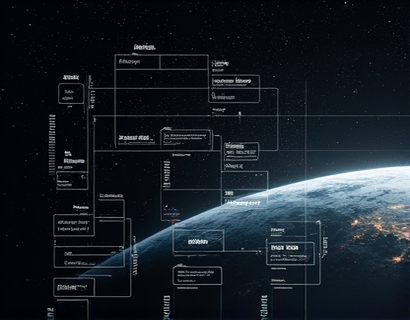Decentralized DAO Management: Streamlining Governance with Cutting-Edge Analytics Software
In the rapidly evolving landscape of decentralized finance and autonomous organizations, the role of governance has become increasingly complex and critical. Decentralized Autonomous Organizations (DAOs) represent a novel approach to governance, leveraging blockchain technology to create transparent, community-driven entities. However, managing a DAO effectively requires robust tools and strategies to ensure efficient decision-making, enhanced collaboration, and sustained growth. This article delves into how innovative analytics software can transform DAO governance, providing administrators with the insights and capabilities needed to navigate the challenges of decentralized management.
The Need for Advanced Governance Tools in DAOs
DAOs operate on a foundation of smart contracts and decentralized networks, which inherently offer transparency and autonomy. However, these same features can also introduce complexities in governance. Decision-making processes, often based on voting mechanisms, can become cumbersome and inefficient without the right tools. Administrators face challenges in aggregating and analyzing data from various sources, ensuring compliance with governance protocols, and fostering active participation from community members. To address these issues, advanced analytics software is essential, offering a suite of features designed to streamline governance and enhance overall performance.
Comprehensive Data Aggregation and Analysis
One of the primary benefits of integrating analytics software into DAO management is the ability to aggregate and analyze data from multiple sources. This includes transaction records, voting outcomes, community engagement metrics, and financial reports. By centralizing this data, administrators can gain a holistic view of the DAO's operations, identifying trends, patterns, and potential issues. For instance, real-time dashboards can display key performance indicators (KPIs) such as voting participation rates, fund utilization, and project progress, enabling quick and informed decision-making.
Moreover, advanced analytics tools can perform predictive analytics, forecasting future scenarios based on historical data. This capability is invaluable for strategic planning, allowing administrators to anticipate market movements, community behavior, and potential governance challenges. By leveraging machine learning algorithms, these tools can provide insights that go beyond traditional data analysis, offering a forward-looking perspective that is crucial for sustainable growth.
Enhanced Transparency and Accountability
Transparency is a cornerstone of DAO governance, and analytics software plays a pivotal role in maintaining this principle. By providing clear and accessible data, administrators can ensure that all members have the information needed to participate effectively in governance processes. Transparent reporting mechanisms can include detailed logs of transactions, voting history, and financial statements, all of which can be accessed and verified by community members.
Accountability is another critical aspect of DAO governance, and analytics tools help enforce this by tracking the actions and decisions of administrators and community members. Audit trails can be generated to record every action taken within the DAO, ensuring that all activities are traceable and transparent. This not only builds trust within the community but also deters malicious behavior, as actions are openly recorded and visible to all stakeholders.
Streamlined Decision-Making Processes
Efficient decision-making is essential for the smooth operation of a DAO. Analytics software can significantly streamline this process by automating routine tasks and providing structured frameworks for decision-making. For example, automated voting systems can be integrated with analytics tools to facilitate the proposal, discussion, and voting phases. These systems can set deadlines, track participation, and tally votes, reducing the administrative burden and ensuring that decisions are made in a timely manner.
Furthermore, analytics tools can support consensus-building by analyzing community sentiment and identifying areas of agreement or disagreement. Sentiment analysis algorithms can process community feedback and discussions, providing insights into the collective mood and preferences. This information can guide administrators in crafting proposals that align with the community's interests, thereby increasing the likelihood of successful outcomes.
Fostering Collaboration and Community Engagement
Collaboration is vital for the success of any DAO, and analytics software can enhance this by facilitating better communication and coordination among members. Collaboration platforms integrated with analytics tools can enable real-time discussions, document sharing, and project management. Administrators can monitor engagement levels, identify key contributors, and recognize areas where more involvement is needed.
To further boost community engagement, analytics tools can track participation metrics such as forum activity, event attendance, and content creation. By visualizing this data, administrators can design targeted initiatives to encourage more active participation. For instance, recognizing and rewarding top contributors can motivate others to get involved, fostering a more vibrant and engaged community.
Risk Management and Compliance
DAOs operate in a regulatory landscape that is still evolving, and ensuring compliance with various laws and standards is a significant concern. Analytics software can aid in risk management by monitoring regulatory changes and assessing the DAO's adherence to legal requirements. Compliance checks can be automated, alerting administrators to potential issues before they become problematic.
Additionally, risk assessment tools can evaluate the DAO's exposure to various risks, including market volatility, smart contract vulnerabilities, and community conflicts. By identifying and mitigating these risks proactively, administrators can safeguard the DAO's assets and reputation, ensuring long-term stability and growth.
Customizable Dashboards and Reporting
One of the key features of advanced analytics software is the ability to create customizable dashboards and reports tailored to the specific needs of DAO administrators. These dashboards can be configured to display the most relevant metrics and KPIs, providing a personalized overview of the DAO's performance. Administrators can set up alerts and notifications for critical events, ensuring they are always informed and ready to act.
Reporting capabilities are equally important, allowing administrators to generate detailed reports for internal review or external disclosure. These reports can be formatted in various ways, such as PDFs or interactive web pages, and can include charts, graphs, and tables to present data clearly and effectively. This functionality ensures that stakeholders have access to comprehensive and accurate information, supporting transparency and accountability.
Case Studies and Real-World Applications
Several DAOs have successfully implemented analytics software to enhance their governance processes. For example, a decentralized governance platform for a community-driven project used analytics tools to streamline their voting system. By integrating real-time data analysis, they were able to reduce the time required for vote tallying from several days to mere hours, increasing efficiency and member satisfaction.
Another case involves a DAO focused on sustainable development, which utilized predictive analytics to forecast funding needs and allocate resources more effectively. The insights gained from data analysis helped the DAO secure additional grants and investments, contributing to the successful completion of multiple projects.
Challenges and Considerations
While the benefits of analytics software in DAO governance are clear, there are also challenges and considerations to keep in mind. One major challenge is the technical complexity involved in implementing and maintaining these systems. Administrators need to ensure that the software is user-friendly and that community members are trained to use it effectively.
Privacy concerns are another critical aspect, as sensitive data must be handled with care. Analytics tools must comply with data protection regulations and implement robust security measures to safeguard user information. Transparency in how data is collected, stored, and used is essential to maintain trust within the community.
Conclusion
In conclusion, integrating cutting-edge analytics software into DAO management can significantly enhance governance, collaboration, and decision-making processes. By providing comprehensive data aggregation, advanced analytics, and streamlined reporting, these tools empower administrators to make informed, data-driven decisions. As the decentralized ecosystem continues to grow, the role of analytics in ensuring efficient and transparent governance will become increasingly vital. Embracing these innovations can help DAOs achieve sustainable growth and maintain their core values of transparency and community involvement.










































